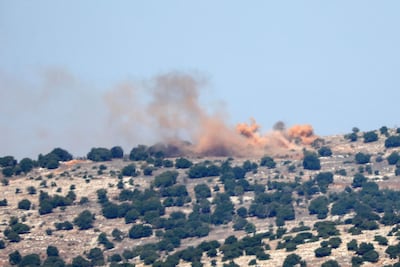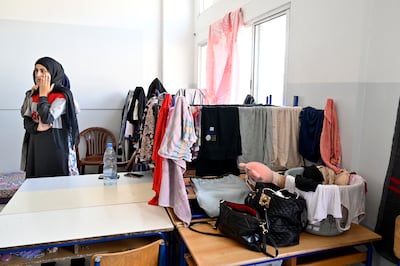Live updates: Follow the latest news on Israel-Gaza
On the first morning of class at the Lebanese University’s Faculty of Sciences in Tyre, students found part of the campus had been converted into a refugee centre for sheltering people displaced from their villages by the southern Lebanon border conflict with Israel.
Meanwhile, on the same campus, the new refugees find themselves crammed in some cases 14 to a room, and sharing a bathroom.
“When we began our classes we were surprised to find that we were sharing our campus with the displaced,” first-year biochemistry student Tala Yassin, 18, told The National. The first indication was a large group of children inexplicably playing in the school’s courtyard.
“Honestly, at first we thought they were Syrian or Palestinian refugees,” said Tala’s friend, Zainab Arzouni. “We just found the kids playing here one day. They were doing some activities with Unicef, so we asked about them. And we were shocked to find out they were Lebanese.”
Three weeks ago on October 8, and after numerous delays due to funding problems, Lebanon’s 2023 academic year finally began. It was the same day hostilities erupted in Lebanon between Israel and the powerful, Iran-backed Hezbollah group that holds sway over the southern part of the country.
Hezbollah is closely allied to Hamas, which controls the Gaza Strip – a Palestinian stretch of land blockaded by Israel. The Iran-backed group has expressed armed support for Hamas and the Palestinian people as Israel wages war on Hamas in Gaza at great cost to civilian life.
For nearly three weeks, the tit-for-tat clashes between Israel and Hezbollah have escalated into a full-blown border conflict, with the slightest miscalculation threatening to ignite a regional war that could spill into Lebanon.

Between 40,000 and 60,000 people have already been displaced from south Lebanon’s border towns, according to the president of Tyre’s municipalities Hassan Dbouk.
Some have simply moved into second homes they owned in cities such as Beirut, or moved in with relatives. But about 6,236 people with nowhere else to go are spread across schools and shelters in southern Lebanese towns such as Tyre, Nabateye and Saida.
The Tyre Technical Institute’s campus hosts the Lebanese University’s Faculty of Science along with two elementary schools, and now houses about 1,200 refugees from southern border towns displaced by Israeli shelling.
Zainab, 17, said her shock at seeing displaced people sheltering in classrooms on campus came from seeing the sheer number.
“The war didn’t even really begin yet,” she said, as she queued for the bus to go home at the end of the school day. In addition to the displaced, "we already have something like 40 martyrs. And in my village, we can hear the bombs and the strikes.”
Since the beginning of Lebanon’s economic crisis in 2019, public school pupils have struggled to receive an education. Economic collapse, the Covid 19 pandemic, teacher strikes and lack of financing have all contributed to what Human Rights Watch has described as “lost learning” for thousands of youngsters.
"We were so happy, we couldn't believe it when the universities reopened [this semester]," Zainab said. "For example the Lebanese University last year was always on strike because of the economic crisis. And now just as classes finally began, so did the war."

'As long as we aren't left sleeping in the streets'
Now that the academic year has finally begun, educators, municipal workers and NGOs in Tyre are struggling to figure out how to accommodate students while also sheltering refugees from nearby towns in three schools on one campus.
For example, while Lebanese University classes have started at the Faculty of Science, the beginning of the technical school's term was delayed while authorities shuffled displaced families around to make room for classes.
“We’re having to move some people out of the rooms and assign two families per room,” said Mr Dbouk, the head of Tyre’s municipalities.
Meanwhile, class sizes have doubled. On the displacement side, two families – as many as 14 people – shelter per classroom.
In the technical institute, there are five bathrooms upstairs and five downstairs, Mr Dbouk said, with only one shower on each level and a limited amount of hot water.
“We try to keep the bathrooms as sanitary as possible.”
Resources are “too small and too little”, according to Hassan Hamoud, vice president of the municipal union. “There are only three mattresses for every five people.”
president of Tyre’s municipalities
Sanitation is a looming issue. With some of the displaced children seeking to enrol in the intermediary and elementary grades at the very schools in which they are sheltering, authorities must take care to ensure illness does not take root.
Already, Mr Dbouk said, scabies has begun to spread.
With so many people and so few bathrooms, illness could soon be a foredrawn conclusion.
“It’s normal. Some people have been here for 15 days. They’re crammed like sardines into the rooms. It’s not a long-term solution at all,” he said.

Rima Sayed, a cheery 16 year old from Beit Lief near the border, told The National she was sharing a room with 13 family members. They evacuated their village two weeks ago when neighbours’ homes were bombarded, too loud and too close for comfort, but she insisted she was not bothered by being in limbo.
“I’m happy to be here because there are people and a community around me. It’s not boring,” she said.
Meanwhile, biochemistry student Zainab Arzouni said she was proud her place of education was being shared with refugees from southern Lebanon.
“It’s a great thing to help people who have nowhere else to go,” she said.
But with authorities struggling to find alternative places to shelter southern Lebanon’s displaced people and no end in sight to the border conflict with Israel, schools will not remain viable residences for long.
For now, residents, pupils and municipal authorities live the only way possible, day by day.
“They say in a week the situation will get better,” Rima said, as she lounged in the campus courtyard. “But I don’t know, I feel like [this conflict] will take longer. That’s fine. As long as we aren’t left sleeping in the streets.”

